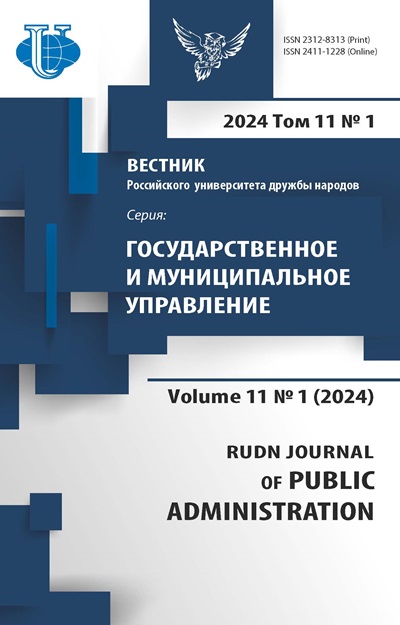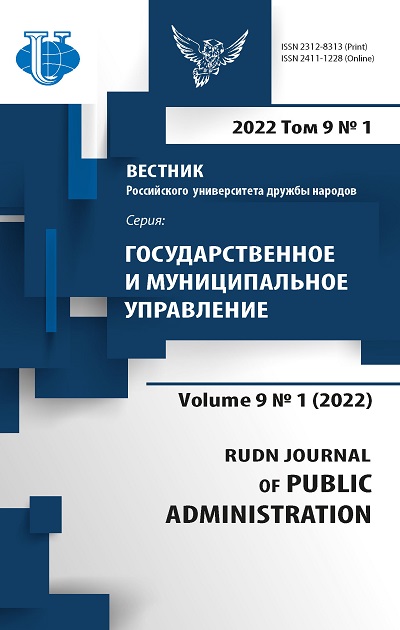Implementation of Russian Universities’ Strategies in the Context of International Academic Rankings
- Authors: Ebzeeva Y.N.1, Gishkaeva L.N.1
-
Affiliations:
- Peoples’ Friendship University of Russia (RUDN University)
- Issue: Vol 9, No 1 (2022)
- Pages: 7-19
- Section: CONTEMPORARY MANAGEMENT OF THE EDUCATIONAL PROCESS
- URL: https://journals.rudn.ru/public-administration/article/view/30589
- DOI: https://doi.org/10.22363/2312-8313-2022-9-1-7-19
Cite item
Full Text
Abstract
The article considers the implementation of strategies for the integration of Russian universities into the system of world academic rankings. The relevance of this work is dictated by the active introduction of Russian universities into the world market of educational services and the modernization of Russian higher education and science in the context of the globalization of these social institutions. For the effective integration of Russian universities into the global educational space, it is necessary to carry out a consistent modernization of both managerial and educational processes, as well as the infrastructure of universities and existing educational programs and standards. One of the aspects of introducing world educational standards into the practice of Russian higher education is the participation of Russian universities in world academic rankings. For the consistent and systematic promotion of the positions of Russian universities in world academic rankings, with the support of the Government of the Russian Federation and the Ministry of Science and Higher Education, national projects were developed to support leading Russian higher education institutions, programs to support innovative development and modernization, and individual roadmaps were drawn up. Development of universities, which allowed them to create their own development strategies and inclusion in the international educational market. The purpose of this article is to consider various aspects of the implementation of the strategies of Russian universities for inclusion in the world academic rankings and systematization of the results achieved so far. The work uses the methods of statistical, comprehensive and comparative analysis in relation to development strategies, roadmaps of Russian universities, as well as to the published results of their promotion in the system of international academic rankings. The result of this work was the derivation of general trends and patterns of development of Russian universities in the context of world academic rankings and the systematization of a set of measures aimed at their further systematic advancement. The positive and negative aspects of the participation of Russian universities in the system of world academic rankings, as well as the influence of the global system for assessing education and science on the Russian sphere of higher education, are analytically derived.
About the authors
Yulia N. Ebzeeva
Peoples’ Friendship University of Russia (RUDN University)
Author for correspondence.
Email: ebzeeva_yun@pfur.ru
ORCID iD: 0000-0002-0043-7590
PhD in Philology, Head of the Department of Foreign Languages (Philological Faculty), First Vice-Rector - Vice-Rector for Education
6, Miklukho-Maklaya str., Moscow, Russian Federation, 117198Luiza N. Gishkaeva
Peoples’ Friendship University of Russia (RUDN University)
Email: gishkaeva_ln@pfur.ru
ORCID iD: 0000-0001-7627-5375
PhD in Philology, Associate Professor of the Department of Foreign Languages (Philological Faculty)
6, Miklukho-Maklaya str., Moscow, Russian Federation, 117198References
- Vinogradova E. Luchshie iz vysshih [The Best of the Highest]. Vedomosti. 98; 01.06.2021 (In Russ.).
- Karpenko O.M., Bershadskaja M.D. Vysshee obrazovanie v stranah mira: analiz dannyh obrazovatel’noj statistiki i global’nyh rejtingov v sfere obrazovanija [Higher Education in the Countries of the World: Analysis of Educational Statistics and Global Rankings in Education]. Moscow: Izd-vo SGU; 2019 (In Russ.).
- Internacionalizacija vysshego obrazovanija: tendencii, strategii, scenarii budushhego [Internationalization of Higher Education: Trends, Strategies, Scenarios for the Future]. Moscow: Logos; 2020 (In Russ.).
- Ledenjova V.Ju. Mezhdunarodnaja obrazovatel’naja migracija v Rossii: potencial i perspektivy [International Educational Migration in Russia: Potential and Prospects]. Sociologija obrazovanija. 2014;3:68–78 (In Russ.).
- Kuznecova A.R. Tendencii obrazovatel’noj migracii v Rossijskoj Federacii [Trends of Educational Migration in the Russian Federation]. Siberian Socium. 2019;3(2):52–65. https://doi.org/10.21684/2587-8484-2019-3-2-52-65 (In Russ.).
- Kuznecova A.R., Kadyrov Je.M., Jagafarova V.A. Osnovnye social’no-jekonomicheskie indikatory razvitija sistemy obrazovanija v Rossii i mire [The Main Socio-economic Indicators of the Development of the Education System in Russia and the World]. Vysshee obrazovanie segodnja. 2013;3:18–21 (In Russ.).
- Polozov A.A. Rejting vuza: jevoljucija problem [University Rating: Evolution of the Problem]. Universitetskoe upravlenie: praktika i analiz. 2011;2(72):85–89 (In Russ.).
- Nacional’nye proekty: celevye pokazateli i osnovnye rezul’taty. Na osnove pasportov nacional’nyh proektov, utverzhdjonnyh prezidiumom Soveta pri Prezidente Rossijskoj Federacii po strategicheskomu razvitiju i nacional’nym proektam 24 dekabrja 2018 g. [National Projects: Targets and Key Results. Based on the Passports of National Projects Approved by the Presidium of the Presidential Council for Strategic Development and National Projects on December 24, 2018]. Moscow; 2019. 56 p. (In Russ.).
- Shhelkunov M.D., Buharaev V.M. Federal’nyj universitet: dialektika stanovlenija [Federal University: Dialectics of Formation]. Vestnik jekonomiki, prava i sociologii. Serija “Sociologija”. 2013;2:242–246 (In Russ.).
- Bornmann L., Haunschild R. Does Evaluative Scientometrics Lose Its Main Focus on Scientific Quality by the New Orientation Towards Societal Impact? Scientometrics. 2017;2(110):937–943. https://doi.org/10.1007/s11192-016-2200-2
- Karpenko O.M., Bershadskaja M.D., Voznesenskaja Ju.A. Mezhdunarodnye rejtingi universitetov kak pokazatel’ kachestva vysshego obrazovanija [International University Rankings as an Indicator of the Quality of Higher Education]. Innovacii v obrazovanii. 2017;6 (In Russ.).
















